Archive for September 29th, 2020
» posted on Tuesday, September 29th, 2020 by Linda Lou Burton
#10. Tyler, John
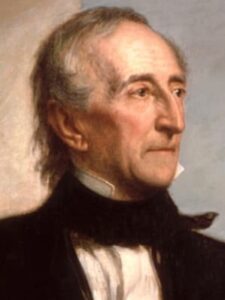 September 29, 2020. Linda Lou Burton posting from Little Rock, Arkansas –John Tyler (March 29, 1790 – January 18, 1862) was the tenth president of the United States (1841 to 1845). He was also the tenth vice-president, and the first president not to BE elected, which led to the nickname “His Accidency.” He got himself sworn in pretty quickly while Congress was still scratching their heads over what to do when a president DIES, the rules weren’t clear on that issue. Turmoil! He moved into the White House with one notion in his head: HE was supposed to make the rules, not Congress. He also didn’t want his Cabinet to boss him around, or the Whigs that had fought so hard with those log cabin images to get the Harrison/Tyler ticket ensconced in Washington. Very quickly the Cabinet resigned, and his own party kicked him out! Yes, he was “party-less” which leads to a very bad joke before I ask if you’d invite him to your party. You see, John’s first wife, Letitia, had a stroke before the White House days, so was unable to take care of First Lady duties. Sadly, she died in the White House while all these other people were backing away from John; so John, being 54 at the time, did what you might expect – he married a young and pretty thing who LOVED to give elegant parties in the White House. The folktale (joke) is that John said: Now they can’t call me a man without a party. Do you believe he said that? Maybe it’s just another Pet Alligator or Cherry Tree myth, but it could have happened. Especially when you hear about Julia’s parties; I find John’s First Ladies are even more interesting than the politics of the day. Would I invite him to my party? I’ll answer when I get to the end.
September 29, 2020. Linda Lou Burton posting from Little Rock, Arkansas –John Tyler (March 29, 1790 – January 18, 1862) was the tenth president of the United States (1841 to 1845). He was also the tenth vice-president, and the first president not to BE elected, which led to the nickname “His Accidency.” He got himself sworn in pretty quickly while Congress was still scratching their heads over what to do when a president DIES, the rules weren’t clear on that issue. Turmoil! He moved into the White House with one notion in his head: HE was supposed to make the rules, not Congress. He also didn’t want his Cabinet to boss him around, or the Whigs that had fought so hard with those log cabin images to get the Harrison/Tyler ticket ensconced in Washington. Very quickly the Cabinet resigned, and his own party kicked him out! Yes, he was “party-less” which leads to a very bad joke before I ask if you’d invite him to your party. You see, John’s first wife, Letitia, had a stroke before the White House days, so was unable to take care of First Lady duties. Sadly, she died in the White House while all these other people were backing away from John; so John, being 54 at the time, did what you might expect – he married a young and pretty thing who LOVED to give elegant parties in the White House. The folktale (joke) is that John said: Now they can’t call me a man without a party. Do you believe he said that? Maybe it’s just another Pet Alligator or Cherry Tree myth, but it could have happened. Especially when you hear about Julia’s parties; I find John’s First Ladies are even more interesting than the politics of the day. Would I invite him to my party? I’ll answer when I get to the end.
Before I tell you how John’s life began, there is one amazing thing about its ending that I want you to keep in mind. He is the only US President whose death was not officially recognized in Washington. When he was laid to rest in 1862, his coffin was draped in a Confederate flag.
From There to the Beginning
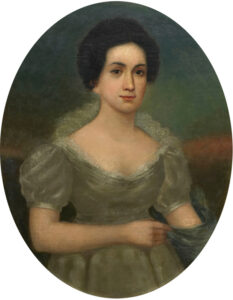 John and his two brothers and five sisters grew up on Greenway Plantation, a 1,200-acre Virginia estate. His father John Sr was a college roommate of Thomas Jefferson at William & Mary and had several political appointments before becoming a Judge. He paid high wages for good tutors to challenge his children academically; he sent John to Prep School at William & Mary at the age of 12; John passed the Virginia Bar at the age of 19. By this time John Sr was Governor of Virginia, and John opened a law practice in Richmond. At the age of 23 he bought a plantation, settled down with his new wife Letitia Christian (1790-1842), and began raising a family. John and Letitia had eight children together; seven lived to adulthood. Letitia was from a prosperous family too; she was shy, quiet, and devoted to her family. Their 29-year marriage appears to have been a happy one. Letitia avoided the limelight during John’s career and at the age of 49 suffered a paralytic stroke. As first lady, she remained in the upstairs living quarters of the White House, coming down only once to attend the wedding of daughter Elizabeth in January 1842. She died that September.
John and his two brothers and five sisters grew up on Greenway Plantation, a 1,200-acre Virginia estate. His father John Sr was a college roommate of Thomas Jefferson at William & Mary and had several political appointments before becoming a Judge. He paid high wages for good tutors to challenge his children academically; he sent John to Prep School at William & Mary at the age of 12; John passed the Virginia Bar at the age of 19. By this time John Sr was Governor of Virginia, and John opened a law practice in Richmond. At the age of 23 he bought a plantation, settled down with his new wife Letitia Christian (1790-1842), and began raising a family. John and Letitia had eight children together; seven lived to adulthood. Letitia was from a prosperous family too; she was shy, quiet, and devoted to her family. Their 29-year marriage appears to have been a happy one. Letitia avoided the limelight during John’s career and at the age of 49 suffered a paralytic stroke. As first lady, she remained in the upstairs living quarters of the White House, coming down only once to attend the wedding of daughter Elizabeth in January 1842. She died that September.
Below you can see the work John was doing before, during, and after his marriage to Letitia, and then to Julia.
Government Positions
- Member of Virginia House of Delegates, 1811-16
- Member of US House of Representatives, 1816-21
- Virginia State Legislator, 1823-25
- Governor of Virginia, 1825-26
- United States Senator, 1827-36
- Vice President, 1841 (under Harrison)
- Tenth President of the United States, 1841-1845
- Member of Confederate States Congress, 1861-62
Yes, John remarried. We’ll give him credit for grieving over Letitia’s death; by all accounts he truly loved her. But it didn’t take long for Julia Gardiner (1820-1889) to strike her mark. She was a New York socialite from a wealthy family and at 22, had already made a reputation as a free-spirited woman. She secretly arranged to appear as a model in a lithograph for a New York department store when she was a teen; her parents sent her away to Europe for a while, but she had already earned a nickname: The Rose of Long Island.
Movie Making Time
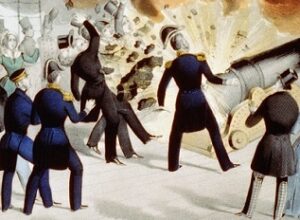 Many HBO movies have plots like this one; mid-life man recently bereaved, friendless, and unpopular at work meets adventurous young woman who rejects his advances with fluttering eyelashes, until, The Day On The Boat. On February 28, 1844, when the Gardiner family was once again visiting Washington, John invited them to a party on a US Navy frigate, the USS Princeton. Four hundred guests were steaming down the Potomac, entertained by the test firings of the “Peacemaker,” a mammoth 13-ton naval gun that lobbed 225-pound cannonballs. Then a horrific accident; the breech exploded and sent shrapnel flying across the deck. Six people were killed – including the Secretary of State, Secretary of the Navy, and Julia’s father, David Gardiner. Julia fainted; John carried her in his arms to a rescue ship.
Many HBO movies have plots like this one; mid-life man recently bereaved, friendless, and unpopular at work meets adventurous young woman who rejects his advances with fluttering eyelashes, until, The Day On The Boat. On February 28, 1844, when the Gardiner family was once again visiting Washington, John invited them to a party on a US Navy frigate, the USS Princeton. Four hundred guests were steaming down the Potomac, entertained by the test firings of the “Peacemaker,” a mammoth 13-ton naval gun that lobbed 225-pound cannonballs. Then a horrific accident; the breech exploded and sent shrapnel flying across the deck. Six people were killed – including the Secretary of State, Secretary of the Navy, and Julia’s father, David Gardiner. Julia fainted; John carried her in his arms to a rescue ship.
So Julia married a man 30-years her senior less than four months later, in a secret ceremony in New York. And the comments began. John Quincy Adams called them “the laughing-stock of the city,” and “the old fable of January and May.” Another critic called John Tyler a “deluded jackass.” Nevertheless, the couple had seven children together, the last when John was 70! Yes, he had FIFTEEN children in all, the most of any US President. To date, at least.
John was still in dire political straits, but didn’t seem to care; he was often seen cozying up to Julia in public. And in the remaining eight months of John’s presidency, she glitzed up the White House in ways never seen before.
Julia hosted extravagant parties that featured champagne and polka dancing. She insisted that the Marine Band play “Hail to the Chief” whenever John arrived at official functions. She wore exotic clothing, traveled in a carriage pulled by Arabian horses, and appeared at balls flanked by white-clad maids of honor. She secured a publicity deal with a New York newspaper columnist, who called her “Lady Presidentress.”
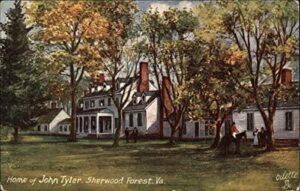 John Tyler wasn’t interested in a second term; he and Julia retired to a Virginia plantation that he named Sherwood Forest – as a “Robin Hood” outlawed by the Whigs. In an effort to mock him, his neighbors appointed him to the minor office of overseer of roads; he took the job seriously, as he did farming his plantation, working hard to maintain large yields. Julia continued hosting parties; they spent their summers at their seaside home. John withdrew from politics until 1861, when local voters elected him to the Virginia Secession Convention. On April 4 he voted for secession; on April 17, after the attack on Fort Sumter and Lincoln’s call for troops, he headed a committee that negotiated the terms for Virginia’s entry into the Confederate States of America. On June 14, he signed the Ordinance of Secession, and one week later the convention unanimously elected him to the Provisional Confederate Congress. Tyler was seated in the Confederate Congress on August 1, 1861, and he served until just before his death in 1862.
John Tyler wasn’t interested in a second term; he and Julia retired to a Virginia plantation that he named Sherwood Forest – as a “Robin Hood” outlawed by the Whigs. In an effort to mock him, his neighbors appointed him to the minor office of overseer of roads; he took the job seriously, as he did farming his plantation, working hard to maintain large yields. Julia continued hosting parties; they spent their summers at their seaside home. John withdrew from politics until 1861, when local voters elected him to the Virginia Secession Convention. On April 4 he voted for secession; on April 17, after the attack on Fort Sumter and Lincoln’s call for troops, he headed a committee that negotiated the terms for Virginia’s entry into the Confederate States of America. On June 14, he signed the Ordinance of Secession, and one week later the convention unanimously elected him to the Provisional Confederate Congress. Tyler was seated in the Confederate Congress on August 1, 1861, and he served until just before his death in 1862.
He died of a stroke in his room at the Ballard Hotel in Richmond January 18, 1862 before the first session opened in February. He was 71; his youngest child Pearl was two. Julia died at the same hotel 27 years later, also suffering a stroke. Though John’s death was not officially recognized in Washington because of his allegiance to the Confederate States of America, Confederate President Jefferson Davis devised a grand funeral, painting him as a hero to the new nation. John Tyler remains the only US president ever laid to rest under a flag not of the United States.
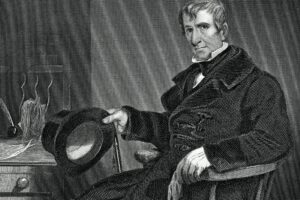 John Tyler is portrayed as one of the nation’s most obscure presidents; “the rhyming end of a catchy campaign slogan.” Still, positive legislation was passed during his term – the “Log-Cabin” bill enabled a settler to claim 160 acres of land before it was offered publicly for sale, and later pay $1.25 an acre for it; and in 1842 a tariff bill protecting northern manufacturers. The Webster-Ashburton treaty ended a Canadian boundary dispute; in 1845 Texas was annexed.
John Tyler is portrayed as one of the nation’s most obscure presidents; “the rhyming end of a catchy campaign slogan.” Still, positive legislation was passed during his term – the “Log-Cabin” bill enabled a settler to claim 160 acres of land before it was offered publicly for sale, and later pay $1.25 an acre for it; and in 1842 a tariff bill protecting northern manufacturers. The Webster-Ashburton treaty ended a Canadian boundary dispute; in 1845 Texas was annexed.
I think I’d invite him to my party, he wasn’t such a bad guy when he got away from politics. We’d probably talk about our kids.
